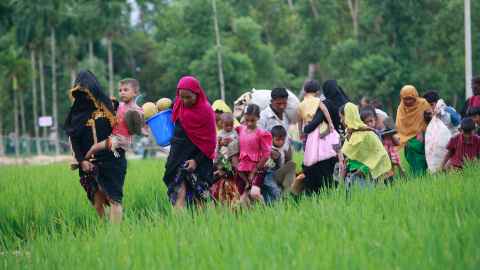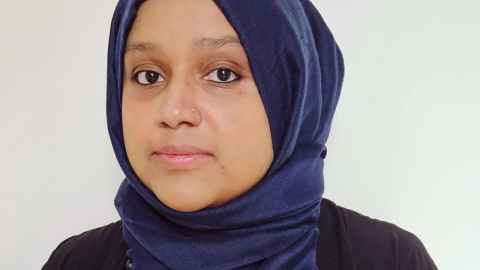Rohingya crisis: a thought-provoking public seminar
15 May 2025
Despite the dire situation for a million stateless Rohingya Muslims from Myanmar, forced to live in vast refugee camps in Bangladesh, life continues and people adapt, a visiting scholar discovered.

Even in the worst of circumstances, people find a way to live... and hope.
This was the revelation for visiting scholar Dr Farhana Afrin Rahman, a Leverhulme Early Career Fellow at the University of Cambridge, and a Junior Research Fellow at Wolfson College Cambridge.
Dr Rahman is the guest speaker at a public seminar on Rohingya refugees in Bangladesh at the University of Auckland. She spent 14 months in the Kutupalong-Balukhali camp in 2017 and 2018, observing how the women living there created a sense of belonging and managed to make lives for themselves, in spite of their circumstances.
Her findings became the basis of her acclaimed book After the Exodus: Gender and Belonging in Bangladesh’s Rohingya Refugee Camps (Cambridge University Press, 2024), which is on the shortlist of the British International Studies Association’s 2025 L.H.M. Ling Outstanding First Book Prize.
During her time in the camp, Dr Rahman found Rohingya women adapted to camp life in various ways. They negotiated marriage and intimate experiences, adjusted to changing gender divisions of labour, and navigated encounters with humanitarian aid agencies and male camp leaders.
“These women strategically bargain shifting power relations to reconstruct their lives in displacement, thereby reclaiming agency and asserting their identity through the spaces they create, inhabit, and reshape, the coping mechanisms they employ, and the bonds of kinship and community they forge,” she says.
'After the Exodus' with Dr Farhana Afrin Rahman
Dr Farhana Afrin Rahman is the guest speaker at After the Exodus with Dr Farhana Afrin Rahman, a public hybrid seminar at the University of Auckland on Monday 19 May from 5 to 6.30pm in the new Arts building B201, lecture theatre 440.
Bringing together critical perspectives on refugee lived experiences, the seminar also features:
- Professor Yvonne Te Ruki Rangi o Tangaroa Underhill-Sem, a Pacific, feminist, development geographer, currently teaching Pacific Studies at Waipapa Taumata Rau University of Auckland.
- Refugee issues expert Professor Jay Marlowe, head of the School of Social Practice and co-founder of the Centre for Asia Pacific Refugee Studies at the University of Auckland.
- Maria Ahmad, a researcher and PhD candidate with a focus on refugee education, social justice and civic participation at the University of Auckland.
Attendees are welcome to join in person or online.
The event is jointly hosted by Anthropology, Pacific Studies and the Centre for Asia Pacific Refugees (CAPRS), in the Faculty of Arts and Education.

Who are the Rohingya?
The Rohingya are a Muslim ethnic minority group who have lived for centuries in predominantly Buddhist Myanmar, formerly known as Burma. Despite living in Myanmar for many generations, the Rohingya are not recognised as an official ethnic group and have been denied citizenship since 1982, making them the world’s largest stateless population. As such, Rohingya families are denied basic rights and protection and are extremely vulnerable to exploitation, sexual and gender-based violence (SGBV) and abuse.
How did the Rohingya refugee crisis begin?
The Rohingya have suffered decades of violence, discrimination and persecution in Myanmar. Their largest exodus began in August 2017 after a massive wave of violence broke out in Myanmar’s Rakhine State, forcing more than 742,000 people - half of them children - to seek refuge in Bangladesh. Entire villages were burned to the ground, thousands of families were killed or separated and massive human rights violations were reported.
Source: UNHCR (The UN Refugee Agency)
Media contact
Julianne Evans | Media adviser
M: 027 562 5868
E: julianne.evans@auckland.ac.nz